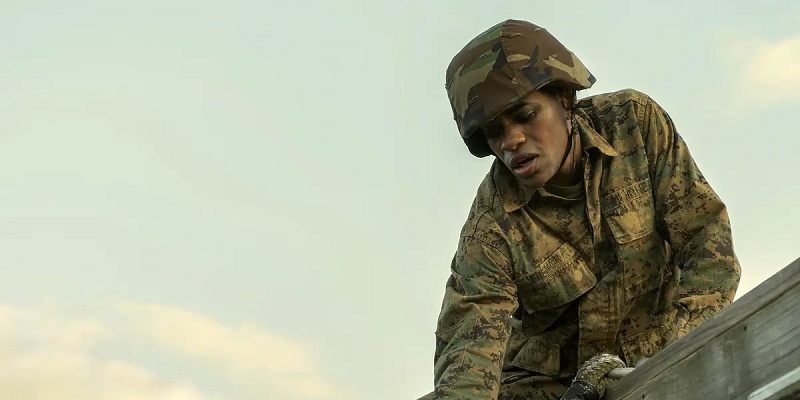
Review by
Benjamin Poole
Directed by: Elegance Bratton
Starring: Jeremy Pope, Raúl Castillo, McCaul Lombardi, Aaron Dominguez, Bokeem Woodbine,
Gabrielle Union

The U.S. military's "Don't Ask, Don't Tell" (DADT) policy regarding LGBTQ+
members prohibited people who "demonstrate a propensity (!) or intent to
engage in homosexual acts" from serving in the army, as apparently their
very presence "would create an unacceptable risk to the high standards of
morale, good order and discipline, and unit cohesion that are the essence
of military capability." Never mind enemy fire, carpet bombs and weapons
of mass destruction; it's the gays you've got to look out for lads.
Inherent to the policy's verb phrase is a seeming non-harassment
imperative for superiors, where any "investigation" into sexuality was
permitted only if "credible homosexual behaviour" was witnessed (the mind
boggles). However, this really translated to a paranoid context where
proud and open gays faced instant dismissal. Once more, the gay man is the
most feared figure in the room, capable of initiating public mandate and
re-ordering the life and death priorities of Uncle Sam himself. Shock and
awe, indeed.

DADT ran from 1994 to 2011, an embarrassingly contemporary timeline which
directly correlates the other morally ambiguous pursuits of the US army
during that decade and a half. Elegance Bratton's
The Inspection takes place during the administration's 2005
mid-point and is based on the gay filmmaker's own experiences of military
bootcamp. Anchored by biography, the outlandish events which Ellis French
(Jeremy Pope) undergoes are given heart-breaking and infuriating
urgency. His drill sergeant Laws (a rivetingly malicious
Bokeem Woodbine) homes in on him from day one, pledging to French
that he "will break" him, while within the macho hierarchy of the training
period his fellow recruits see him as a legitimate target for bullying.
They don't like it up 'em.
To me, there has always been something deeply ostentatious about the US
military anyway: all the pomp, the fussing over uniforms, the
hoo-fucking-rah disco call. No wonder they call it boot "camp," eh?!
The Inspection furthermore suggests that the military is an
institution suffused with a repressed yet insistent psychosexuality; we
see Laws intimidate a recruit by handling the kid's rifle in the same
manner one would stimulate the orifice of a lover, and in one bedtime
sequence the straight soldiers all "jack off" (in the US parlance) to
mail-day pornography under their sheets(!). I suppose there is an argument
that closeness to death and violence thickens the blood, and moreover that
repression intensifies such longing. Something is in the air alright, so
it is perhaps plausible that French, while daydreaming about handsome bear
officer Rosales (Raúl Castillo) in the shared shower, accidentally
"pops a boner," much to his compatriot's shrieking revulsion (the communal
changing room: the eternal arena of heterosexual panic), giving these
bullies the "credible" ammunition they need to make French's training
hell. According to the tenements of "Catch DADT," any official complaint
about prejudicial behaviour is grounds for legitimate discharge.

French's fellow recruits are bullies because bullying is what the army
inevitably engenders. Screaming at imaginary assailants, firing at paper
shadows during target practice, constantly alert to threat: the recruits
are re-socialised, with mind and body attuned to perceive enemies around
every corner. Much like sports, that other implicitly masculine arena, the
training is seen as competition, with certain players such as the gay
French and an Arabic recruit perceived as other, and their identities are
duly used against them. Ability, skill, and dedication are qualities not
as prized as conforming and toeing the line. It is understandable, then,
that French withdraws into glossy and extended gay fantasies about his
fellow recruits and cheering that he refuses to buckle. In my favourite
scene, on a stealth exercise French uses camouflage paint as make up,
expertly contouring his face in the manner of a winning Drag Race
contestant (inexplicably, French seems to have found some silver
highlighter from somewhere, too!). Defiant and fabulous: this is a film
not just about the experiences of The Gays, but for them, too.

If it's such a pain in the arse being a recruit, then why does French
persevere? In the time honoured genre platitude, he's got "nowhere else to
go." His mother (Gabrielle Union - love) is a complete cow to him,
and refuses French's sexuality in the same way you or I would repudiate a
predatory paedophile. In the film's opening French is homeless, living
hand to mouth in shared shelters. At least the army provides food and
board, and, moving up Maslow's triangle, could it possibly offer a sense
of belonging, too? The film ends in a title card which reinforces this
talented filmmaker's own military service, presenting a validity to the
narrative of broken homes and punishing ordeals. Depending on how far
French's represented experiences mirror Bratton's own, the dedication to
the director's mother is either a sweet touch or a towering "Fuck you!"

The Inspection is on Netflix UK/ROI now.

